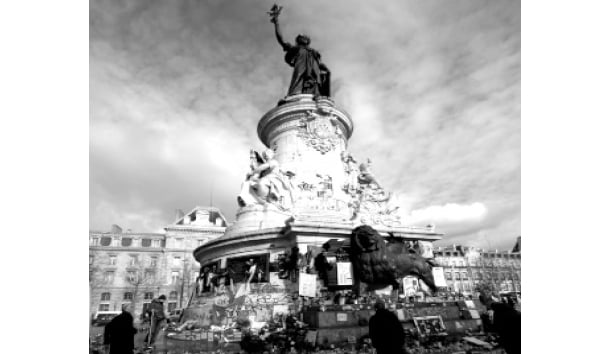In the days that followed the November terrorist attacks, many here in Paris were paralyzed. Friends of mine refused to leave their homes. Businesses stayed closed. This is a level of violence and death to which those of us in the First World are simply unaccustomed, though modern jihad threatens to change that very quickly. Thousands of people canceled plans to come to Paris. Air France reported a loss of €54 million in bookings. Hotels lost millions. Small businesses have been hurt as well. The owner of an excellent restaurant, La Mercerie, in Saint-Germain-Des-Prés told me in December that he had lost €30,000 of bookings to date. Even Lyon, three hours away by high-speed train, canceled its multimillion-euro annual event, the Fête des lumières, which was scheduled for the first weekend in December. The risk and tensions were simply too great.
And yet, in spring 2016, nothing has really changed. We are all a bit wounded from those days, yet no one has any concrete solutions. As in America, we are told not to “scapegoat immigrants,” and that Islam is a “religion of peace.” Above all, we must not allow the right to “exploit tragedy for gain.” Yet in the magazines, in the cafés, and in private conversations, there is a skepticism about this approach and mindset. There are plenty on the French left who are starting to sense, with alarm, that there is a perfect storm of general discontent and unease brewing that the attacks have only highlighted.
First, there are those Muslims living in the Parisian suburbs who rioted back in 2005. On the tenth anniversary of those riots, many observed that nothing has changed apart from some superficial building projects, the equivalent of shuffling the deck chairs. During the Charlie Hebdo attacks a former resident of those suburbs, Amédy Coulibaly, attacked a kosher supermarket. (It’s not just a problem in Paris; the Brussels suburbs housed perpetrators of the November attacks.) The French quietly acknowledge that there is a de facto apartheid on racial, economic, and religious grounds. Not only are these Muslims not being inculturated into France and French life, but some are actively choosing to live apart, preferring a ghetto to what they see as decadent Western living.
Then there is the general migrant crisis engulfing Europe, precipitated primarily by the destabilization of the Middle East through clumsy Western interventions. Already struggling with the migrants the country has taken in through the normal course of affairs, France cannot handle refugees of war. The French security forces are reasonably concerned that ISIS may use Europe’s overly generous refugee policy to penetrate France and launch further attacks. President Hollande has raised the possibility of a suspension of the border-free Schengen Area, something that would have been unthinkable to mention this time last year, even in the wake of the Charlie Hebdo attacks.
A number of media outlets highlighted how many times the November attackers had freely come and gone about Europe, often being personally tracked within the “terror watch” system, and had traveled from Europe to the Middle East, and even, unbelievably, back to Belgium in the hours after the attacks. There is no legal mechanism to hold people simply “on suspicion,” even if they are on watch lists.
Finally, while the “Brexit” debate (concerning the possible departure of Great Britain from the European Union) will, I think, prove more light than heat, the very idea that a prosperous member-state is considering exit is an existential threat to the E.U. If a country with one of the strongest and most prosperous economies wants to leave the E.U., why would any other country want to join—or stay? For all the bluster of the Tories and the games behind the “renegotiations” that Mr. Cameron is undertaking, Britain will vote to stay in the E.U., as Scotland voted to stay in Great Britain. Yet the French themselves are conflicted on Europe—which is why they sent Marine Le Pen’s Front National to the European Parliament with an overwhelming mandate and gave her almost seven million votes, the most her party has ever received, in the December regional elections that the Front narrowly lost. For perhaps the first time in its history, the E.U. is under serious threat, and it would take only a major event or two to topple it.
And yet I tell concerned friends and relatives that, when it comes to further jihadist attacks, it’s not a matter of if but of when. Yes, there are more troops on the street and on patrol, but there is no courage or stomach to face the real problems. In the land of the so-called Enlightenment, there is no lucid thinking.
Instead, many are too busy proclaiming “we are not afraid” to admit that, in fact, we are quite afraid, and that we have no solutions to the most serious threat to France since the wars of religion, when people actually took their faith seriously. In a faithless society, the only thing everyone agrees on is that faith has no place in the public sphere. In practice, that means the agenda is set by those who take their “faith” seriously and who rightly hold in contempt the masses of Frenchmen who believe faith has no active, everyday component. We’ve already seen thrice in 14 months (don’t forget last summer’s train attack in which American soldiers on weekend leave had to save the day) what they are capable of. Will a fourth attack finally awaken the sleeping Gauls?
Don’t hold your breath.

Leave a Reply